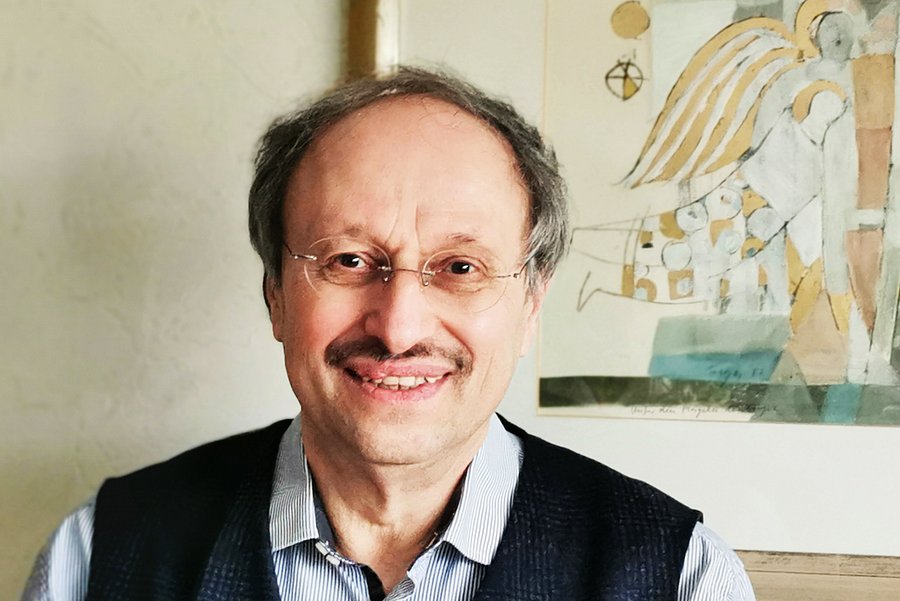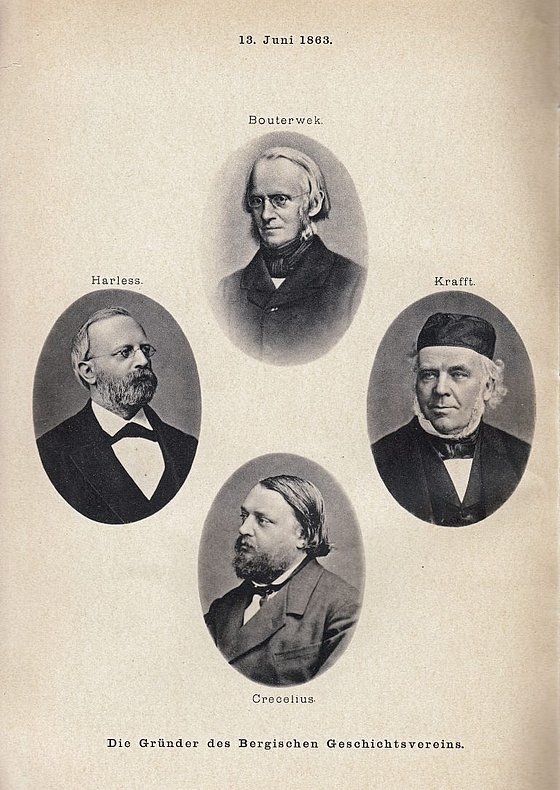
Conveying a sense of home
Prof Dr Wolfgang Heinrichs / Modern History
Photo: Private
Conveying a sense of home
Prof Dr Wolfgang Heinrichs on the long history of the Bergischer Geschichtsverein, Wuppertal site
A chance encounter
Legend has it that the headmaster of a grammar school, Dr Wilhelm Bouterwek, and the pastor Karl Krafft met more or less by chance in the waiting room at the railway station in Elberfeld in 1863. An interesting conversation ensued in which both gentlemen also discussed their studies and decided to found a historical association. 13 June 1863 is regarded as the birthday of the Bergischer Geschichtsverein. In the conference room of the so-called 'old grammar school' in Elberfeld's Grünstraße, eight gentlemen finally came together to establish the historical society.
According to the first constitution, the aim was to research "(the) political and church history of the former duchies of Jülich, Cleve and Berg". In the very first year of its existence, the results were published in the 'Zeitschrift des Bergischen Geschichtsvereins (Journal of the Bergische Geschichtsverein)', which still exists today. The Wuppertal section was formed in 1938 from a merger of the local associations in Elberfeld and Barmen. Today, it has around 650 members and is the largest of the 15 sites of the Bergischer Geschichtsverein, which has around 4,000 members in total.
"From the very beginning, the focus has always been on the question of identity," Professor Wolfgang Heinrichs explains. He is a private lecturer in modern history and acting chairperson of the board of the Bergischer Geschichtsverein, Wuppertal section, "which arose shortly before the emergence of the German Empire for the individual regions. How do the people in our region locate themselves within the German nation as a whole? It was an educational measure."

Founder of the Bergischer Geschichtsverein
Photo: BGV-Wuppertal
Awareness of home rather than a sense of home
"We convey an awareness of home rather than a sense of home," explains Heinrichs, "We point out the location to people who live in this region and, to a certain extent, convey a sense of orientation." The association gets to the bottom of things and always asks why something has developed this way or that. "What are the social references of our region or homeland?" the historian asks, "How was this communicated back then? How did a sense of togetherness develop in the first place? And how did it develop?" In other words, you always scrutinise your own location and take a fresh look at it.
Together with the Bergischer Geschichtsverein, Wuppertal site, there are a total of 14 other sites that are well networked with each other. "We have joint projects that we also finance together. One example is the magazine for the Bergisch Land, 'Romerike Berge', which is published three to four times a year, as well as the Journal of the Bergischer Geschichtsverein, which applies to everyone. We meet every year in a delegates' meeting and as board members we are also in constant dialogue with each other."
Logo of the Bergischer Geschichtsverein, Wuppertal section
The library of the Bergischer Geschichtsverein
The Bergischer Geschichtsverein is considered the largest regional history association in Germany and has a considerable library that can be used by all citizens. "Most of it is located in the city library, but also in the city archives," Heinrichs says. It also includes art objects, most of which are now stored in the Museum of Early Industrialisation. Since 2017, two scientists have been working on the project 'Safeguarding the cultural assets of the Bergischer Geschichtsverein' with the long-term goal of compiling a catalogue, that provides a complete overview of the collection. Membership of the Bergischer Geschichtsverein is always worthwhile, says Heinrichs, as it allows you to use the city library free of charge and you regularly receive the association's journals free of charge. With its 'History in Wuppertal' series, the Wuppertal association provides its members with new articles and refers to current research.
Wide range of Bergisch topics
Twice a year, the Bergischer Geschichtsverein publishes a flyer with a full programme of events. "We recently had an interesting lecture on the 1848/49 revolution and its impact on consciousness," the historian says happily. However, the association also has interesting topics in store for historically interested listeners in the coming year. In February, a lecture will focus on the Wuppertal women's rights activist Helene Stöcker, whose works will also be recited.
With 4,500 objects, Wuppertal has the highest density of monuments in North Rhine-Westphalia. Reason enough for the Bergischer Geschichtsverein to report on current monument protection in Wuppertal in another lecture. And to mark the 100th anniversary of the death of Reich President Friedrich Ebert, the upcoming members' meeting will also feature a presentation on his life in Barmen and Elberfeld. Excursions are also always on the events’ agenda. "We will soon be offering an excursion to the forest park Königshöhe. We will be providing information about the monuments of August von der Heydt that he donated to the city."
Places of the history of democracy
The Bergischer Geschichtsverein is entering into another internal cooperation with the City History Centre in 2025. "It's about democratic places in Wuppertal," explains Heinrichs. A student project was launched back in 2023 to identify, research, and communicate places of democratic history. At that time, eight places were selected where historical events took place. This list is now to be continuously expanded. The project is part of a national network whose aim is to promote awareness of the history of German democracy and freedom – locally, regionally and throughout Germany – and to encourage democratic participation and civil courage.
Arousing interest in children
The Wuppertal section of the Bergischer Geschichtsverein has also published books for children. One is called 'Erklär mir mal Wuppertal’ (‘Explain Wuppertal to me') and is aimed at primary school children. However, contact with schools is difficult, because although the association would give the materials away, contact is only established hesitantly, even though they are always willing to get involved in the schools personally. For that reason, social media formats are now part of the programme. "We also want to reach younger people with a youth-appropriate format," the historian explains. "For teenagers, we are therefore networked on Instagram and Facebook."
The Bergischer Geschichtsverein website states: 'The Wuppertal site can look back on a long tradition of cooperation with other associations, companies and institutions'. This also includes the University of Wuppertal. "You can see from the last chairmen how intensive the contacts with the university were. The historians Prof Johrendt and Prof Wittmütz were already chairmen and many academics from the university are members of the association."
You can join at any time. Detailed information is also available online on the website of the Bergische Geschichtsverein https://www.bgv-wuppertal.de/.
Uwe Blass
Wolfgang Heinrichs is Associate Professor of Modern History in the School of Humanities at the University of Wuppertal with a special focus on church history. He is a member of the Association of Free Christian Schools in Düsseldorf and on the extended board of the North Rhine-Westphalian State Association of History Teachers (Landesverband nordrhein-westfälischer Geschichtslehrerinnen und Geschichtslehrer).
He is also a pastor in the Association of Free Evangelical Churches (Bund Freier evangelischer Gemeinden in Deutschland) and teaches church history at the Theologische Hochschule Ewersbach and at the Johanneum in Wuppertal.
